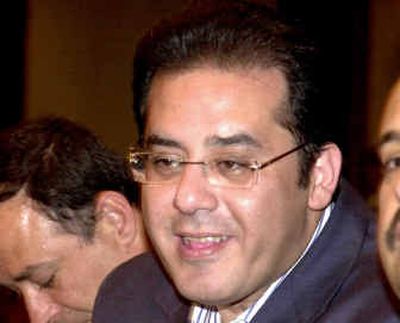Egypt charges opposition leader with fraud

CAIRO, Egypt – Egyptian prosecutors charged opposition leader Ayman Nour with falsifying signatures on official papers, advancing a controversial case that has thrown doubt on Egypt’s commitment to democratic reform and created tensions with the United States, the country’s biggest aid donor.
Nour, 40, a lawyer and democracy advocate, was the first politician to declare for the presidency after President Hosni Mubarak proposed to hold Egypt’s first open election. Nour announced his candidacy from jail, where he was held for more than 40 days while prosecutors investigated the fraud charges. He was released on bail March 12.
Nour said the indictment would “not affect my presidential campaign, and what they have done will build my public support.”
Nour will stand trial with six other members of his Tomorrow Party, but his attorney, Amir Salem, said it was unlikely that Nour could be tried and a verdict reached before the presidential vote in September.
“This was expected,” Salem said. “They will not arrest him, and while on trial, he does not lose any of his civil rights. The case could take a long time.”
Nour is charged with forging signatures on 1,435 documents out of 2,000 he filed to gain government authorization for his party, which won official recognition last October. The Tomorrow Party promotes free-market economic reforms and an end to 52 years of one-man rule in Egypt.
Nour needed 50 signed documents to fulfill the minimum requirement for registering the party, but “was in a rush to present the largest possible number to the Political Parties Committee to convince the members that his party enjoys huge popularity,” chief prosecutor Maher Abdel Wahed said. Abdel Wahed set no date for the start of Nour’s trial.
Coming at a time when President Bush was singling out Egypt as ripe for democratization, Nour’s detention aroused criticism within the Bush administration and was a factor in Secretary of State Condoleezza Rice’s decision to cancel a visit to Egypt last month.
The United States provides $2 billion in annual assistance to Egypt, which Mubarak has ruled for 24 years. His four six-year terms were ratified by referendums in which his was the only name on the ballot.
Though Mubarak’s ruling National Democratic Party is considering proposals to relax restrictions on freedom of the press and assembly, Nour and other opposition leaders have accused the government of trying to limit reforms and of attempting to smooth the way for the eventual election of Mubarak’s son, Gamal, as president.
Political observers say Nour could win up to 30 percent of the vote in a race against the elder Mubarak, who has the advantage of incumbency and a grip on a huge bureaucracy and police force. Mubarak has not said he will run, although members of his party have indicated they will nominate him.